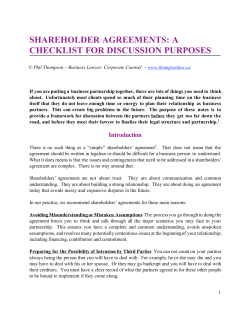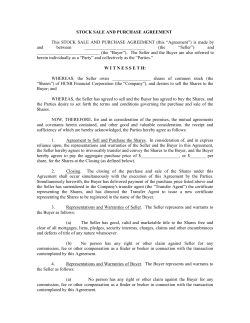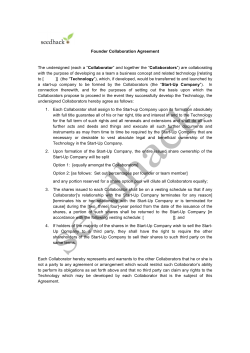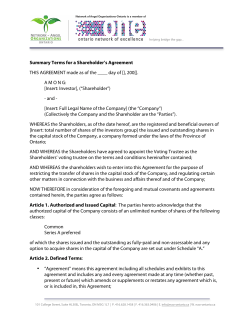
UNDERSTANDING RESTRICTED STOCK & PERFORMANCE AWARDS STOCK PLAN BASICS
STOCK PLAN BASICS UNDERSTANDING RESTRICTED STOCK & PERFORMANCE AWARDS Restricted stock grants and performance awards provide immediate value at the time of vesting, and can be an important part of your overall financial picture. Understanding what they are, and how to cover any associated taxes, can help you make the most of the important benefits they provide. Restricted stock grants, once vested, give you an ownership stake in your company via shares of stock. Once your company has released the shares to you, you can hold these shares as part of your portfolio or sell them at your discretion. Restricted stock has value at vesting regardless of whether or not the stock price has increased since the date of grant. When granted restricted stock, you’ll first need to accept the grant. In most cases, restricted stock is free, although some companies may charge a nominal amount per share. Since you will have paid nothing or very little for the stock, you can sell it for a profit after it vests. A restricted stock grant is said to be “vested” when you own the shares free of grant restrictions—meaning you have the authority to sell, transfer, or make other important decisions concerning the shares. Vesting conditions can be time-based or contingent upon the achievement of certain performance goals, also known as performance awards. The rate at which you take unrestricted ownership of the stock—referred to as the “vesting schedule”—is described in your grant agreement, and displayed in your stock plan account on the Portfolios sub-tab under the Employee Stock Plans tab at etrade.com. KNOW THE TYPES OF RESTRICTED STOCK Restricted Stock Awards – A grant of company stock in which your rights to take full ownership of the stock are restricted until the shares vest. Once the vesting requirements are met you own the shares outright and may treat them as you would any other shares in your account. You’ll typically have voting and dividend benefits, if applicable, from the grant date. Restricted Stock Units – You are given a grant valued in terms of company stock, though actual stock is not issued until your vesting requirements are satisfied. As with restricted stock awards, these requirements can be based on time and/or performance. Typically, you will not have voting or dividend benefits until the shares vest. Performance Awards – A grant of restricted stock awards or units in which your rights to the shares are contingent upon the achievement of certain pre-established performance goals. At the end of the performance period, your company will assess whether you have met the original performance goals and may adjust the awarded number of shares you receive accordingly. THINGS TO CONSIDER WHEN DECIDING TO SELL OR HOLD: Duration of Ownership - Depending on your attitude toward risk, you may want to sell your shares when they vest, or you may find it more attractive to hold them with the expectation their value will increase over time. Diversification & Company Stock Ownership - Determining how much company stock you want to own can help you decide whether to sell your shares upon release or keep them. You may also want to consider issues of diversification so that your portfolio isn’t overly dependent on any one investment. STOCK PLAN BASICS IMPORTANT TAX ISSUES FOR RESTRICTED STOCK Before you make your tax payment elections or sell shares, you’ll want to carefully consider the tax consequences. Tax treatment for each transaction depends on the type of restricted stock you own. For advice on your personal financial situation, please consult a tax advisor.1 For Restricted Stock Awards – Generally, there are two tax events - at vesting and at the time you sell the shares. However, it is possible to move up the first tax trigger from the vesting date to the grant date by filing a Section 83(b) election with the IRS. This must be done within 30 days of the grant date. Please keep in mind that paying taxes at grant can be risky, as there are no allowances for refund or tax loss if your shares fail to vest. Also, you should check with your company to see if they allow this type of election. For Restricted Stock Units – There are two tax events - at vesting and upon sale of shares. IRS Section 83(b) does not apply to restricted stock units. It is possible to defer the receipt of shares from a restricted stock unit. If this election is made, employment taxes will still be due at vesting, but income taxes can be deferred until the shares are released to you. Again, you should check with your company to see if they allow this type of election. For Performance Awards – Like restricted stock units, your performance awards will be taxed in accordance with the type of underlying grant (that is, restricted stock award or restricted stock unit) as described above. For the first tax trigger (vesting date or grant date if you have made an 83(b) election) on either award type, you’ll pay tax on the market value of the stock on the vest date minus whatever you may have paid for the shares. For example, if you have 100 shares vesting at $30 a share and there was no charge for the shares, you’ll recognize income of $3,000. This is treated as ordinary income, which means that your employer will report it on Form W-2, and establishes your cost basis in the shares. When you sell your shares, you’ll also have to pay tax on any capital gains you may realize. To determine your gain, simply subtract the price of the stock at the first tax trigger (vesting or grant) from the price when you sold the shares, then multiply by the number of shares you sold. If you held the stock for a year or longer after the date of the earlier tax trigger, you’ll realize a long-term capital gain, which is usually taxed at a lower rate, as opposed to a short-term capital gain. Any long-term capital losses you may incur are not taxable and may even be deductible. Please note that if your grant offers dividend benefits before vesting, any dividends your company issues will likely be reported on your W-2 as wages. As a general rule, these types of dividends are not eligible for the beneficial tax treatment of qualified dividends until after vesting. A CLOSER LOOK AT POTENTIAL TAX SCENARIOS* Let’s take a look at the potential tax consequences for different types of restricted stock awards and elections. This hypothetical example assumes a grant of 100 shares/units of company stock issued at no cost to the employee. Option Type Restricted Stock Award or Unit Taxes at Grant Taxes at Vest Taxes on Share Sale Fair Market Value (FMV) at Grant = $25 FMV at Vest = $30 Sale Price = $45 Not applicable $45 - $30 = $15 100 shares X $30 = $3,000 taxed as ordinary income** 100 shares X $15 = $1,500 taxed as capital gain Restricted Stock Award 100 shares X $25 = $2,500 Under Rule 83(b) taxed as ordinary income Not applicable $45 - $25 = $20 100 shares X $20 = $2,000 taxed as capital gain * Tax treatment for each transaction depends on the type of restricted stock you own. Please keep in mind that these examples are based on hypothetical conditions. For advice on your personal financial situation, please consult a tax advisor. ** If you have elected to defer the receipt of the shares from your restricted stock unit, only employment taxes would be due at vest. The income taxes would be due on the gain at the time the shares are released to you. STOCK PLAN BASICS TAX PAYMENT METHODS Typically, you will be taxed upon vesting (unless you make a Section 83(b) election or your employer allows you to defer receipt of your shares). There are several methods available to pay your tax withholding obligation through either the use of cash in your account, the sale of shares, or your company withholding shares. You should check your specific plan details to determine which tax payment methods your employer has made available for you. Depending on your company’s elections, E*TRADE can assist with three methods. These include cash transfer and the full or partial sale of your shares.1 1. Log on to etrade.com, and visit the Employee Stock Plans tab. 1 2. Go to the Restricted Stock section under Plan Elections, and then click Elect next to the particular grant. 3. Under Election, make your selection from the menu available to you for each vesting period. Choices vary by company, and may include: 2 Withhold Shares - Indicates that your employer will withhold enough shares to cover the taxes due. The net remaining shares will be released to you. Same-Day Sale – Sell all vested shares being released from the particular grant. You’ll end up with cash proceeds in your linked E*TRADE Securities brokerage account, less any fees and taxes. 3 Sell-to-Cover – Keep some of your shares, but sell just enough to cover any associated fees and taxes. You’ll end up with shares of stock in your stock plan account. Cash Transfer – Keep your vested shares, and pay any associated fees and taxes with your own cash funds. You’ll end up with shares of stock in your stock plan account. You’ll need to ensure that you have adequate funds in your account to cover the cost of fees and taxes. The tax calculator on the Employee Stock Plans tab can help you estimate this amount. GET DEDICATED SUPPORT WHEN YOU NEED IT. Visit our Online Service Center at etrade.com/servicecenter or call us at 1-800-838-0908 anytime, Monday–Friday. From outside the U.S. or Canada, call +1-650-599-0125. One of our dedicated stock plan professionals will be happy to assist you. STOCK PLAN BASICS CONSIDER YOUR OPTIONS WITH HELP FROM E*TRADE When you are ready to sell your shares, your proceeds will be automatically deposited into your linked E*TRADE Securities brokerage account. You can then reinvest the funds according to your own financial plan or access your proceeds through a variety of convenient cash management tools, including Quick Transfer.2 At E*TRADE Securities, you’ll find the tools, calculators, and personalized guidance you need to make important decisions about your restricted stock benefits. Plus, we give you an array of investment options and resources to help you make the most of your proceeds. Powerful Options Calculators & Modelers STOCKS Estimate the value of your holdings, compare ETFs the impact of different transaction types, assessBONDS various tax scenarios, and more.1 STOCKS Online Advisor Use our professional tool to getETFs a recommendBONDS ed investment solution targeted to your goals. FREE Investing & Trading Education STOCKS Including live and on-demand web seminars, ETFs videos, BONDS and in-depth articles to help you invest with confidence.4 STOCKS ETFs BONDS FREE Guidance &STOCKS Advice From experiencedETFs investment professionals STOCKS ETFs who can help you BONDS create a plan, execute your BONDS 3 strategy, and allocate your assets. A Full Range of Investments Trade stock and options and access more than 7,600 mutual funds, every ETF sold, and 30,000 bonds & fixed income products. Take Control of Your Retirement With the Pain-Free, No Annual Fee, No Minimum IRA. Use our state-of-the art Retirement QuickPlan tool or talk to a retirement planning specialist. PLEASE READ THE IMPORTANT DISCLOSURES BELOW The fund’s prospectus contains its investment objectives, risks, charges, expenses, and other important information, and should be read and considered carefully before investing. For a complete prospectus visit etrade.com/mutualfunds or visit the Exchange-Traded Funds Center at etrade.com/etf. All Stock Plan assets and grants are subject to the terms of the plan and the grant documents. A change in your employment status may result in forfeiture of assets and may affect vesting periods and expiration dates. Values shown are for illustration purposes only and do not reflect deductions for applicable taxes, commissions and fees. Because there is no market for unrealized or unvested assets, these are hypothetical values based on the market price of unrestricted shares, and the value that you realize, if any, may be higher or lower. Your E*TRADE Securities LLC account statement is the only official record of your account. Data shown on etrade.com is based on your company’s records. The company reserves the right to make corrections to this data. All awards shown are subject to the terms of the grants of such awards and of the plan under which the grants were made. Products and services shared in this document are available to participants domiciled in the domestic United States only. 1. E *TRADE Financial Corporate Services, Inc., E*TRADE Securities LLC, and its affiliates do not provide legal, accounting or tax advice. Please consult your own legal, accounting and tax advisers. 2. For details and important information about Quick Transfer, please visit etrade.com/quicktransfer for a listing of limitations, restrictions and time deadlines. 3 Investment recommendations are provided by representatives from E*TRADE Securities LLC, a broker-dealer member of FINRA. Portfolio management services are provided by E*TRADE Capital Management, LLC, an investment adviser registered with the SEC. To help determine which guidance option may be right for you, please visit etrade.com/guidance for additional information about account minimums, commissions, fees, etc. 4 Online & in-person education is being provided to you for educational purposes only. No information presented constitutes a recommendation by E*TRADE Financial or its affiliates to buy, sell or hold any security, financial product or instrument discussed therein or to engage in any specific investment strategy. The content neither is, nor should be construed as, an offer, or a solicitation of an offer, to buy, sell, or hold any securities by E*TRADE Financial Corporation. or its affiliates. Neither E*TRADE Financial Corporation. nor its affiliates offer or provide any opinion regarding the nature, potential, value, suitability or profitability of any particular investment or investment strategy, and you are fully responsible for any investment decisions you make. Such decisions should be based solely on your evaluation of your financial circumstances, investment objectives, risk tolerance and liquidity needs. Neither E*TRADE Financial Corporation nor any of its affiliates is affiliated with the third party providing this content. The E*TRADE Financial family of companies provides financial services that include trading, investing, banking and managing employee stock plans. Securities products and services offered by E*TRADE Securities LLC, Member FINRA/SIPC. Employee stock plan solutions are offered by E*TRADE Financial Corporate Services, Inc. E*TRADE Financial Corporate Services, Inc. and E*TRADE Securities LLC are separate but affiliated companies. © 2010 E*TRADE Financial Corporation. All rights reserved. GET DEDICATED SUPPORT WHEN YOU NEED IT. Visit our Online Service Center at etrade.com/servicecenter or call us at 1-800-838-0908 anytime, Monday–Friday. From outside the U.S. or Canada, call +1-650-599-0125. One of our dedicated stock plan professionals will be happy to assist you.
© Copyright 2025





















